2020-2021高考英语一模试题分类汇编——阅读理解综合及答案解析
2020-2021英语一模试题分类汇编——阅读理解综合含详细答案
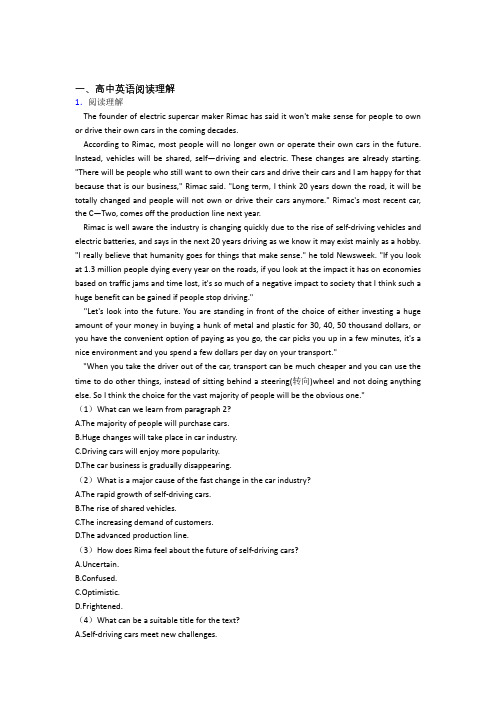
一、高中英语阅读理解1.阅读理解The founder of electric supercar maker Rimac has said it won't make sense for people to own or drive their own cars in the coming decades.According to Rimac, most people will no longer own or operate their own cars in the future. Instead, vehicles will be shared, self—driving and electric. These changes are already starting. "There will be people who still want to own their cars and drive their cars and I am happy for that because that is our business," Rimac said. "Long term, I think 20 years down the road, it will be totally changed and people will not own or drive their cars anymore." Rimac's most recent car, the C—Two, comes off the production line next year.Rimac is well aware the industry is changing quickly due to the rise of self-driving vehicles and electric batteries, and says in the next 20 years driving as we know it may exist mainly as a hobby. "I really believe that humanity goes for things that make sense." he told Newsweek. "If you look at 1.3 million people dying every year on the roads, if you look at the impact it has on economies based on traffic jams and time lost, it's so much of a negative impact to society that I think such a huge benefit can be gained if people stop driving.""Let's look into the future. You are standing in front of the choice of either investing a huge amount of your money in buying a hunk of metal and plastic for 30, 40, 50 thousand dollars, or you have the convenient option of paying as you go, the car picks you up in a few minutes, it's a nice environment and you spend a few dollars per day on your transport.""When you take the driver out of the car, transport can be much cheaper and you can use the time to do other things, instead of sitting behind a steering(转向)wheel and not doing anything else. So I think the choice for the vast majority of people will be the obvious one."(1)What can we learn from paragraph 2?A.The majority of people will purchase cars.B.Huge changes will take place in car industry.C.Driving cars will enjoy more popularity.D.The car business is gradually disappearing.(2)What is a major cause of the fast change in the car industry?A.The rapid growth of self-driving cars.B.The rise of shared vehicles.C.The increasing demand of customers.D.The advanced production line.(3)How does Rima feel about the future of self-driving cars?A.Uncertain.B.Confused.C.Optimistic.D.Frightened.(4)What can be a suitable title for the text?A.Self-driving cars meet new challenges.B.Self-driving cars avoid human errors.C.Possessing or driving cars won't be a must.D.Conventional cars will be completely replaced.【答案】(1)B(2)A(3)C(4)C【解析】【分析】本文是一篇议论文,讲述了由于自动驾驶车辆和电池的兴起,在不远的将来人们不用再买车和驾车,此外自动驾驶车辆将给社会和环境带来巨大好。
2020-2021高考英语一模试题分类汇编——阅读理解综合
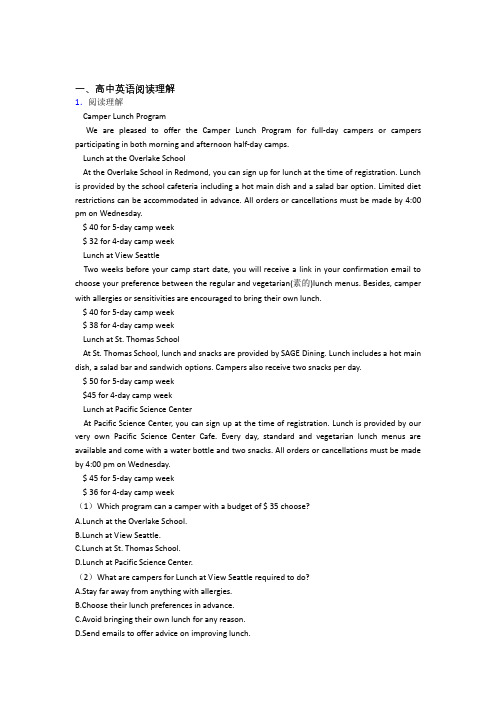
一、高中英语阅读理解1.阅读理解Camper Lunch ProgramWe are pleased to offer the Camper Lunch Program for full-day campers or campers participating in both morning and afternoon half-day camps.Lunch at the Overlake SchoolAt the Overlake School in Redmond, you can sign up for lunch at the time of registration. Lunch is provided by the school cafeteria including a hot main dish and a salad bar option. Limited diet restrictions can be accommodated in advance. All orders or cancellations must be made by 4:00 pm on Wednesday.$ 40 for 5-day camp week$ 32 for 4-day camp weekLunch at View SeattleTwo weeks before your camp start date, you will receive a link in your confirmation email to choose your preference between the regular and vegetarian(素的)lunch menus. Besides, camper with allergies or sensitivities are encouraged to bring their own lunch.$ 40 for 5-day camp week$ 38 for 4-day camp weekLunch at St. Thomas SchoolAt St. Thomas School, lunch and snacks are provided by SAGE Dining. Lunch includes a hot main dish, a salad bar and sandwich options. Campers also receive two snacks per day.$ 50 for 5-day camp week$45 for 4-day camp weekLunch at Pacific Science CenterAt Pacific Science Center, you can sign up at the time of registration. Lunch is provided by our very own Pacific Science Center Cafe. Every day, standard and vegetarian lunch menus are available and come with a water bottle and two snacks. All orders or cancellations must be made by 4:00 pm on Wednesday.$ 45 for 5-day camp week$ 36 for 4-day camp week(1)Which program can a camper with a budget of $ 35 choose?A.Lunch at the Overlake School.B.Lunch at View Seattle.C.Lunch at St. Thomas School.D.Lunch at Pacific Science Center.(2)What are campers for Lunch at View Seattle required to do?A.Stay far away from anything with allergies.B.Choose their lunch preferences in advance.C.Avoid bringing their own lunch for any reason.D.Send emails to offer advice on improving lunch.(3)What do the last two programs have in common?A.They receive registrations only on Wednesday.B.They encourage campers to bring some snacks.C.They are mainly intended for vegetarian campers.D.They provide campers with two snacks each day.【答案】(1)A(2)B(3)D【解析】【分析】本文是一篇应用文,向露营者介绍了一些午餐项目的相关信息。
2020-2021高考英语一模试题分类汇编——阅读理解综合附答案

一、高中英语阅读理解1.Choose the one that fits best according to the information given in the passage you have just read."The history of the world is but the biography (传记) of great men," argued Thomas Carlyle, the advocate of what has come to be known as the "Great Man Theory of History." This theory suggests that the broader movements and outline of history all go back to the leadership of great individuals who had unique influence on their times. Whether or not Carlyle's theory proves true is debatable, but that certain individuals cast long shadows is not.As one who is entrusted with a leadership position, I find it profitable to read of others who have led. Wherever you find me, you'll likely find a good biography nearby. Why is this the case? First, I find good biographies fascinating. I'll occasionally read a novel, but I've never been overly drawn to fiction. I have found myself unable to sleep while in the struggle of the Battle of Britain in William Manchester's The Last Lion. For me, not to read biographies would rob me of pleasure in my life.Second, I find good biographies informative. A good biographer tells not only the story of a person, but also of their times. Reading a good biography is like wandering through an intellectual shopping mall. The first store is what drew you there, but you will be pleasantly surprised along the way at what other items grab your attention. You'll find no better account of the British Empire at its peak than the opening chapters of Manchester's Visions of Glory, volume one of his The Last Lion. Strictly speaking, a biography is but a slice of history.Third, I find good biographies relaxing. Winston Churchill once noted a man who works with his hands should have a hobby that engages his mind, and a man who works with his mind should have a hobby that engages his hands. Another way to apply Churchill's saying is to combine technical, pen-in-hand vocational reading with leisurely biographical reading. Indeed, few things are more relaxing to me than winding down the evening and entering into another world.This is why I love reading good biographies, and why I pity the person who neglects them. Don't be counted among their number.(1)What is implied in the first paragraph?A. The author finds Carlyle's theory undebatable.B. Carlyle believes great men alone cannot create history.C. It is debatable whether one should read great men's biographies.D. The author agrees that history is greatly influenced by certain men.(2)What does the underlined phrase "other items" in the third paragraph refer to?A. good biographiesB. stories of certain timesC. the volumes of The Last LionD. the chapters of the British Empire(3)Which of the following statements is TRUE?A. The author considers biographical reading enjoyable.B. The author can travel to another world in the evening.C. The author has fought many battles during his lifetime.D. The author profits commercially by reading biographies.(4)What is the author's main purpose in writing the article?A. To analyze the benefits of vocational reading.B. To introduce to readers his unique reading strategies.C. To present great men's history through biography reading.D. To recommend biography reading through his own experiences.【答案】(1)D(2)B(3)A(4)D【解析】【分析】本文是一篇议论文,作者阐述了喜欢读好的传记的原因。
2020-2021全国各地高考模拟试卷英语分类:阅读理解综合题汇编及详细答案
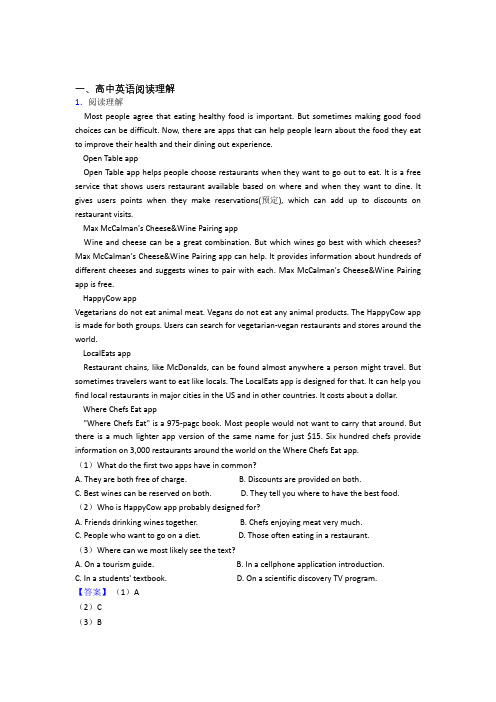
一、高中英语阅读理解1.阅读理解Most people agree that eating healthy food is important. But sometimes making good food choices can be difficult. Now, there are apps that can help people learn about the food they eat to improve their health and their dining out experience.Open Table appOpen Table app helps people choose restaurants when they want to go out to eat. It is a free service that shows users restaurant available based on where and when they want to dine. It gives users points when they make reservations(预定), which can add up to discounts on restaurant visits.Max McCalman's Cheese&Wine Pairing appWine and cheese can be a great combination. But which wines go best with which cheeses? Max McCalman's Cheese&Wine Pairing app can help. It provides information about hundreds of different cheeses and suggests wines to pair with each. Max McCalman's Cheese&Wine Pairing app is free.HappyCow appVegetarians do not eat animal meat. Vegans do not eat any animal products. The HappyCow app is made for both groups. Users can search for vegetarian-vegan restaurants and stores around the world.LocalEats appRestaurant chains, like McDonalds, can be found almost anywhere a person might travel. But sometimes travelers want to eat like locals. The LocalEats app is designed for that. It can help you find local restaurants in major cities in the US and in other countries. It costs about a dollar.Where Chefs Eat app"Where Chefs Eat" is a 975-pagc book. Most people would not want to carry that around. But there is a much lighter app version of the same name for just $15. Six hundred chefs provide information on 3,000 restaurants around the world on the Where Chefs Eat app.(1)What do the first two apps have in common?A. They are both free of charge.B. Discounts are provided on both.C. Best wines can be reserved on both.D. They tell you where to have the best food.(2)Who is HappyCow app probably designed for?A. Friends drinking wines together.B. Chefs enjoying meat very much.C. People who want to go on a diet.D. Those often eating in a restaurant.(3)Where can we most likely see the text?A. On a tourism guide.B. In a cellphone application introduction.C. In a students' textbook.D. On a scientific discovery TV program.【答案】(1)A(2)C(3)B【解析】【分析】本文是一篇应用文,介绍了五个帮助他们了解健康饮食的应用软件。
2020-2021【英语】英语一模试题分类汇编——阅读理解综合附答案解析
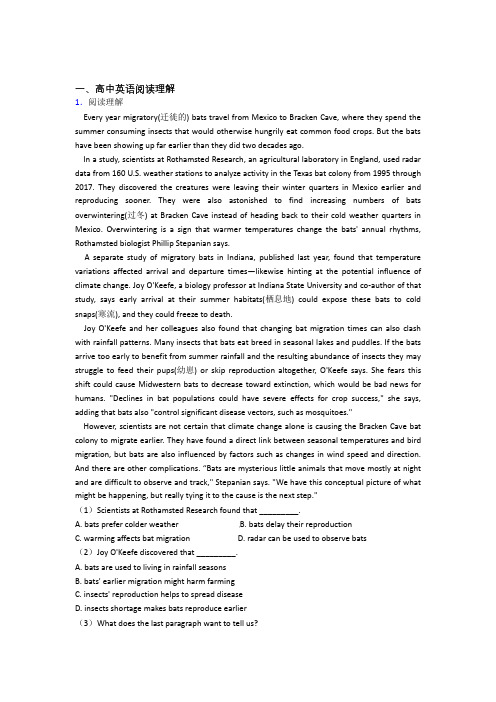
一、高中英语阅读理解1.阅读理解Every year migratory(迁徙的) bats travel from Mexico to Bracken Cave, where they spend the summer consuming insects that would otherwise hungrily eat common food crops. But the bats have been showing up far earlier than they did two decades ago.In a study, scientists at Rothamsted Research, an agricultural laboratory in England, used radar data from 160 U.S. weather stations to analyze activity in the Texas bat colony from 1995 through 2017. They discovered the creatures were leaving their winter quarters in Mexico earlier and reproducing sooner. They were also astonished to find increasing numbers of bats overwintering(过冬) at Bracken Cave instead of heading back to their cold weather quarters in Mexico. Overwintering is a sign that warmer temperatures change the bats' annual rhythms, Rothamsted biologist Phillip Stepanian says.A separate study of migratory bats in Indiana, published last year, found that temperature variations affected arrival and departure times—likewise hinting at the potential influence of climate change. Joy O'Keefe, a biology professor at Indiana State University and co-author of that study, says early arrival at their summer habitats(栖息地) could expose these bats to cold snaps(寒流), and they could freeze to death.Joy O'Keefe and her colleagues also found that changing bat migration times can also clash with rainfall patterns. Many insects that bats eat breed in seasonal lakes and puddles. If the bats arrive too early to benefit from summer rainfall and the resulting abundance of insects they may struggle to feed their pups(幼崽) or skip reproduction altogether, O'Keefe says. She fears this shift could cause Midwestern bats to decrease toward extinction, which would be bad news for humans. "Declines in bat populations could have severe effects for crop success," she says, adding that bats also "control significant disease vectors, such as mosquitoes."However, scientists are not certain that climate change alone is causing the Bracken Cave bat colony to migrate earlier. They have found a direct link between seasonal temperatures and bird migration, but bats are also influenced by factors such as changes in wind speed and direction. And there are other complications. “Bats are mysterious little animals th at move mostly at night and are difficult to observe and track," Stepanian says. "We have this conceptual picture of what might be happening, but really tying it to the cause is the next step."(1)Scientists at Rothamsted Research found that _________.A. bats prefer colder weatherB. bats delay their reproductionC. warming affects bat migrationD. radar can be used to observe bats(2)Joy O'Keefe discovered that _________.A. bats are used to living in rainfall seasonsB. bats' earlier migration might harm farmingC. insects' reproduction helps to spread diseaseD. insects shortage makes bats reproduce earlier(3)What does the last paragraph want to tell us?A. Wind speed and direction affect bats.B. It is difficult to observe and track bats.C. Climate change makes bats migrate earlier.D. Further research on the cause is necessary.(4)What is the best title for the passage?A. Bats' habitatsB. Endangered batsC. Bats' scheduleD. Bats, our good friends【答案】(1)C(2)B(3)D(4)C【解析】【分析】【点评】本文是一篇说明文,作者先提出蝙蝠迁徙提前的这种现象,然后分析了这种现象可能导致的后果,最后分析了可能导致蝙蝠迁徙提前的原因。
2020-2021高考英语一模试卷分类汇编任务型阅读(含答案)
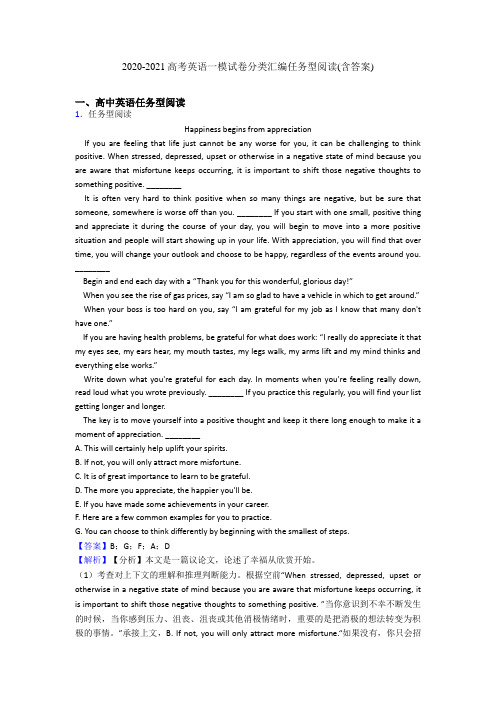
2020-2021高考英语一模试卷分类汇编任务型阅读(含答案)一、高中英语任务型阅读1.任务型阅读Happiness begins from appreciationIf you are feeling that life just cannot be any worse for you, it can be challenging to think positive. When stressed, depressed, upset or otherwise in a negative state of mind because you are aware that misfortune keeps occurring, it is important to shift those negative thoughts to something positive. ________It is often very hard to think positive when so many things are negative, but be sure that someone, somewhere is worse off than you. ________ If you start with one small, positive thing and appreciate it during the course of your day, you will begin to move into a more positive situation and people will start showing up in your life. With appreciation, you will find that over time, you will change your outlook and choose to be happy, regardless of the events around you. ________Begin and end each day with a “Thank you for this wonderful, glorious day!”When you see the rise of gas prices, say “I am so glad to have a vehicle in which to get around.”When your boss is too hard on you, say “I am grateful for my job as I know that many don't have one.”If you are having health problems, be grateful for what does work: “I really do appreciate it that my eyes see, my ears hear, my mouth tastes, my legs walk, my arms lift and my mind thinks and everything else works.”Write down what you're grateful for each day. In moments when you're feeling really down, read loud what you wrote previously. ________ If you practice this regularly, you will find your list getting longer and longer.The key is to move yourself into a positive thought and keep it there long enough to make it a moment of appreciation. ________A. This will certainly help uplift your spirits.B. If not, you will only attract more misfortune.C. It is of great importance to learn to be grateful.D. The more you appreciate, the happier you'll be.E. If you have made some achievements in your career.F. Here are a few common examples for you to practice.G. You can choose to think differently by beginning with the smallest of steps.【答案】B;G;F;A;D【解析】【分析】本文是一篇议论文,论述了幸福从欣赏开始。
2020-2021英语一模试题分类汇编——阅读理解综合附答案解析
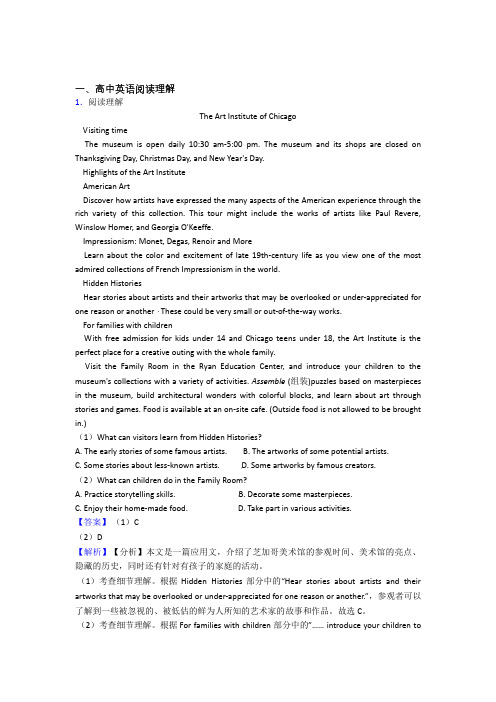
一、高中英语阅读理解1.阅读理解The Art Institute of ChicagoVisiting timeThe museum is open daily 10:30 am-5:00 pm. The museum and its shops are closed on Thanksgiving Day, Christmas Day, and New Year's Day.Highlights of the Art InstituteAmerican ArtDiscover how artists have expressed the many aspects of the American experience through the rich variety of this collection. This tour might include the works of artists like Paul Revere, Winslow Homer, and Georgia O'Keeffe.Impressionism: Monet, Degas, Renoir and MoreLearn about the color and excitement of late 19th-century life as you view one of the most admired collections of French Impressionism in the world.Hidden HistoriesHear stories about artists and their artworks that may be overlooked or under-appreciated for one reason or another These could be very small or out-of-the-way works.For families with childrenWith free admission for kids under 14 and Chicago teens under 18, the Art Institute is the perfect place for a creative outing with the whole family.Visit the Family Room in the Ryan Education Center, and introduce your children to the museum's collections with a variety of activities. Assemble (组装)puzzles based on masterpieces in the museum, build architectural wonders with colorful blocks, and learn about art through stories and games. Food is available at an on-site cafe. (Outside food is not allowed to be brought in.)(1)What can visitors learn from Hidden Histories?A. The early stories of some famous artists.B. The artworks of some potential artists.C. Some stories about less-known artists.D. Some artworks by famous creators.(2)What can children do in the Family Room?A. Practice storytelling skills.B. Decorate some masterpieces.C. Enjoy their home-made food.D. Take part in various activities.【答案】(1)C(2)D【解析】【分析】本文是一篇应用文,介绍了芝加哥美术馆的参观时间、美术馆的亮点、隐藏的历史,同时还有针对有孩子的家庭的活动。
2020-2021【英语】英语一模试题分类汇编——阅读理解综合附详细答案
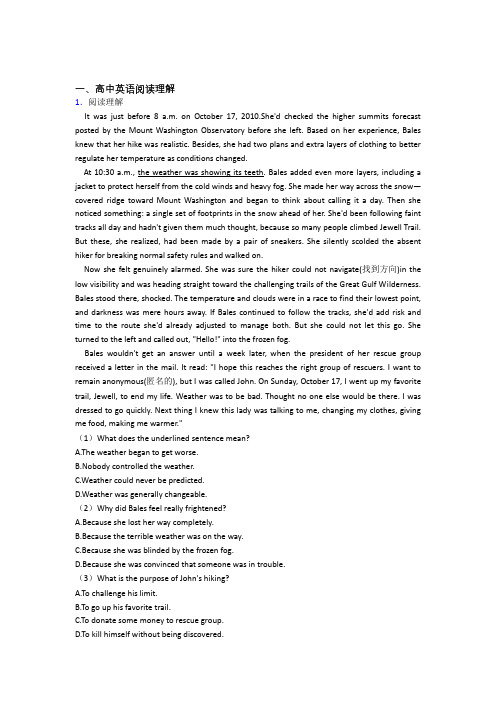
一、高中英语阅读理解1.阅读理解It was just before 8 a.m. on October 17, 2010.She'd checked the higher summits forecast posted by the Mount Washington Observatory before she left. Based on her experience, Bales knew that her hike was realistic. Besides, she had two plans and extra layers of clothing to better regulate her temperature as conditions changed.At 10:30 a.m., the weather was showing its teeth. Bales added even more layers, including a jacket to protect herself from the cold winds and heavy fog. She made her way across the snow—covered ridge toward Mount Washington and began to think about calling it a day. Then she noticed something: a single set of footprints in the snow ahead of her. She'd been following faint tracks all day and hadn't given them much thought, because so many people climbed Jewell Trail. But these, she realized, had been made by a pair of sneakers. She silently scolded the absent hiker for breaking normal safety rules and walked on.Now she felt genuinely alarmed. She was sure the hiker could not navigate(找到方向)in the low visibility and was heading straight toward the challenging trails of the Great Gulf Wilderness. Bales stood there, shocked. The temperature and clouds were in a race to find their lowest point, and darkness was mere hours away. If Bales continued to follow the tracks, she'd add risk and time to the route she'd already adjusted to manage both. But she could not let this go. She turned to the left and called out, "Hello!" into the frozen fog.Bales wouldn't get an answer until a week later, when the president of her rescue group received a letter in the mail. It read: "I hope this reaches the right group of rescuers. I want to remain anonymous(匿名的), but I was called John. On Sunday, October 17, I went up my favorite trail, Jewell, to end my life. Weather was to be bad. Thought no one else would be there. I was dressed to go quickly. Next thing I knew this lady was talking to me, changing my clothes, giving me food, making me warmer."(1)What does the underlined sentence mean?A.The weather began to get worse.B.Nobody controlled the weather.C.Weather could never be predicted.D.Weather was generally changeable.(2)Why did Bales feel really frightened?A.Because she lost her way completely.B.Because the terrible weather was on the way.C.Because she was blinded by the frozen fog.D.Because she was convinced that someone was in trouble.(3)What is the purpose of John's hiking?A.To challenge his limit.B.To go up his favorite trail.C.To donate some money to rescue group.D.To kill himself without being discovered.【答案】(1)A(2)D(3)D【解析】【分析】本文是一篇记叙文,贝尔斯在天气恶劣时去登山,无意发现一串往危险区域行进的脚印,她知道有人陷入了困境。
2020-2021全国高考英语阅读理解的综合高考模拟和真题分类汇总附答案解析
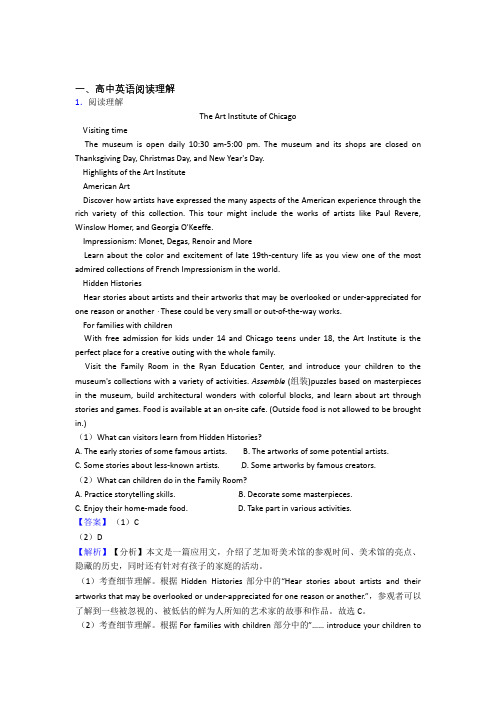
一、高中英语阅读理解1.阅读理解The Art Institute of ChicagoVisiting timeThe museum is open daily 10:30 am-5:00 pm. The museum and its shops are closed on Thanksgiving Day, Christmas Day, and New Year's Day.Highlights of the Art InstituteAmerican ArtDiscover how artists have expressed the many aspects of the American experience through the rich variety of this collection. This tour might include the works of artists like Paul Revere, Winslow Homer, and Georgia O'Keeffe.Impressionism: Monet, Degas, Renoir and MoreLearn about the color and excitement of late 19th-century life as you view one of the most admired collections of French Impressionism in the world.Hidden HistoriesHear stories about artists and their artworks that may be overlooked or under-appreciated for one reason or another These could be very small or out-of-the-way works.For families with childrenWith free admission for kids under 14 and Chicago teens under 18, the Art Institute is the perfect place for a creative outing with the whole family.Visit the Family Room in the Ryan Education Center, and introduce your children to the museum's collections with a variety of activities. Assemble (组装)puzzles based on masterpieces in the museum, build architectural wonders with colorful blocks, and learn about art through stories and games. Food is available at an on-site cafe. (Outside food is not allowed to be brought in.)(1)What can visitors learn from Hidden Histories?A. The early stories of some famous artists.B. The artworks of some potential artists.C. Some stories about less-known artists.D. Some artworks by famous creators.(2)What can children do in the Family Room?A. Practice storytelling skills.B. Decorate some masterpieces.C. Enjoy their home-made food.D. Take part in various activities.【答案】(1)C(2)D【解析】【分析】本文是一篇应用文,介绍了芝加哥美术馆的参观时间、美术馆的亮点、隐藏的历史,同时还有针对有孩子的家庭的活动。
2020-2021高考英语一模试卷分类汇编 阅读理解(含答案)

2020-2021高考英语一模试卷分类汇编阅读理解(含答案)一、高中英语阅读理解1.阅读短文,从每题所给的A、B、C和D四个选项中,选出最佳选项。
Many people have long dreamed of being able to fly around as simply as riding a bicycle. Yet the safety and strength of a flying bike was always a big problem. Over the past 10 years, developments in technology have moved the dream of personal flying vehicles closer to reality. Now, two groups of inventors say such vehicles may be available soon.The British company Malloy Aeronautics has developed a prototype (原型) of its flying bicycle. Grant Stapleton, marketing sales director of Malloy Aeronautics, says the Hoverbike is able to get in and out of small spaces very quickly." It can be moved across continents very quickly because it can be folded and packed," he adds.Mr. Stapleton says safety was the company's main concern. He says the designers solved the safety issue by using overlapping rotors to power the vehicle.The company is testing a full-size prototype of the Hoverbike, which will most likely be used first by the police and emergency rescue teams.In New Zealand, Martin Aircraft Company is also testing a full-size prototype of its personal flying device, called the Jetpack. It can fly for more than 30 minutes, up to 1, 000 meters high and reach a speed of 74 kilometers per hour.Peter Coker is the CEO of Martin Aircraft Company. He said the Jetpack "is built around safety from the start". In his words, "Reliability is the most important element of it. We have safety built into the actual structure itself, very similar to a Formula One racing car.The Jetpack uses a gasoline-powered engine that produces two powerful jet streams. Mr. Coker says it also has a parachute that would be used, if there should be an emergency. "It starts to work at very low altitude and actually saves both the aircraft and the pilot," he adds. Mr. Coker says the Jetpack will be ready for sale soon.(1)We can learn from the passage that the Hoverbike ________.A. can hardly get in and out of small spaces quicklyB. can fly for over 30 minutes, up to 1, 000 meters highC. has been used by the police and emergency rescue teamsD. can be transported quickly after being folded and packed(2)Peter Coker uses the example of Formula One racing car to show that ________.A. the Jetpack is very safe and reliableB. the engine of the Jetpack is powerfulC. the actual structure of the Jetpack is uniqueD. the Jetpack can reach a great speed and height(3)The underlined word "It" in the last paragraph refers to ________.A. the jet streamB. the engineC. the JetpackD. the parachute (4)What is the author's main purpose of writing the passage?A. To describe the problems of inventing flying vehicles.B. To introduce the latest development of flying vehicles.C. To show the differences between two flying vehicles.D. To advertise the two personal flying vehicles.【答案】(1)D(2)A(3)D(4)B【解析】【分析】本文是一篇说明文,讲述一种个人飞行工具很快就会应用于现实,然而安全性和强度一直是个大问题,文中介绍了两家研发飞行器的公司的最新的产品,新产品把安全放在首位,并对产品进行了改进。
2020-2021高考英语一模试卷分类汇编 阅读理解(及答案)

2020-2021高考英语一模试卷分类汇编阅读理解(及答案)一、高中英语阅读理解1.阅读理解As winter set in, it's the perfect time to get out of town and escape the seasonal mood disorder. Here are vacation ideas to adopt now.Costa RicaCosta Rica, located in the Valle del General, is an off-the-radar agriculture town that's not overrun with tourists. The area is known for its coffee, pineapples and sugar cane plantations, as well as its rich forests. What's more, you can enjoy horseback riding, spend afternoons at the spa or tour a nearby wildlife shelter to look out for colorful birds, sloths and other animals.Los Cabos, MexicoIf you love wine, travel to Los Cabos, a beautiful vacation destination at the southern edge of the Baja Peninsula. During your getaway, you can enjoy special wine tastings and dinner cooked by Los Cabos's Michelin-starred chef. There are wildlife-viewing opportunities, too. From December through May, you can spot whales, manta rays and more wildlife.Petit St Vincent, the GrenadinesThis private Caribbean island was spared the anger of hurricanes Irma and Maria. What's more, the whole island is only 115 acres and has 22 cottages. Each cottage is located in a quiet place, and you can expect to unplug and recharge phones with no wireless connections, televisions or telephones in the cottages. Even better, you can spend your days admiring fascinating marine (海洋的) life at the Jean-Michel Cousteau Diving Caribbean center.The Exumas, BahamasOn Fowl Cay's 50-acre private island, you can enjoy a carefree escape. Days can be spent fishing, boating and diving before wandering along white sands. The resort features large one-, two- and three-bedroom houses. Best of all, if you're planning a group getaway or multigenerational trip, you rent the entire island for a one-of-a-kind island escape.(1)Why does the author recommend these places to readers?A. To escape from extreme weather.B. To experience out-of-town sights.C. To beat winter blues.D. To treat mental diseases.(2)What do we know about Petit St Vincent?A. It suffered from Irma and Maria.B. It's a huge and quiet island.C. People can admire fish off shore.D. People can charge phones using wireless connections(3)Where can Tom best go with his grandparents and parents?A. Los Cabos, Mexico.B. Petit St Vincent, the Grenadines.C. Costa Rica.D. The Exumas, Bahamas.【答案】(1)D(2)C(3)D【解析】【分析】本文是一篇应用文,介绍了冬天来临之时,适合外出度假的一些地点。
2020-2021高考英语一模试卷分类汇编 阅读理解(附答案) (2)
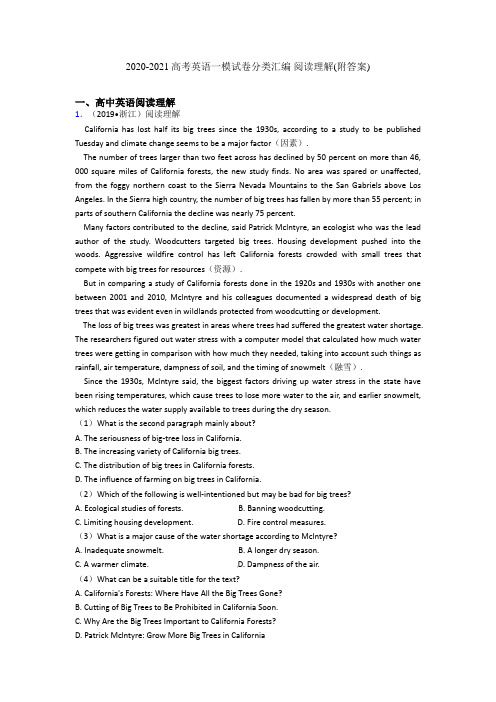
2020-2021高考英语一模试卷分类汇编阅读理解(附答案)一、高中英语阅读理解1.(2019•浙江)阅读理解California has lost half its big trees since the 1930s, according to a study to be published Tuesday and climate change seems to be a major factor(因素).The number of trees larger than two feet across has declined by 50 percent on more than 46, 000 square miles of California forests, the new study finds. No area was spared or unaffected, from the foggy northern coast to the Sierra Nevada Mountains to the San Gabriels above Los Angeles. In the Sierra high country, the number of big trees has fallen by more than 55 percent; in parts of southern California the decline was nearly 75 percent.Many factors contributed to the decline, said Patrick Mclntyre, an ecologist who was the lead author of the study. Woodcutters targeted big trees. Housing development pushed into the woods. Aggressive wildfire control has left California forests crowded with small trees that compete with big trees for resources(资源).But in comparing a study of California forests done in the 1920s and 1930s with another one between 2001 and 2010, Mclntyre and his colleagues documented a widespread death of big trees that was evident even in wildlands protected from woodcutting or development.The loss of big trees was greatest in areas where trees had suffered the greatest water shortage. The researchers figured out water stress with a computer model that calculated how much water trees were getting in comparison with how much they needed, taking into account such things as rainfall, air temperature, dampness of soil, and the timing of snowmelt(融雪).Since the 1930s, Mclntyre said, the biggest factors driving up water stress in the state have been rising temperatures, which cause trees to lose more water to the air, and earlier snowmelt, which reduces the water supply available to trees during the dry season.(1)What is the second paragraph mainly about?A. The seriousness of big-tree loss in California.B. The increasing variety of California big trees.C. The distribution of big trees in California forests.D. The influence of farming on big trees in California.(2)Which of the following is well-intentioned but may be bad for big trees?A. Ecological studies of forests.B. Banning woodcutting.C. Limiting housing development.D. Fire control measures.(3)What is a major cause of the water shortage according to Mclntyre?A. Inadequate snowmelt.B. A longer dry season.C. A warmer climate.D. Dampness of the air.(4)What can be a suitable title for the text?A. California's Forests: Where Have All the Big Trees Gone?B. Cutting of Big Trees to Be Prohibited in California Soon.C. Why Are the Big Trees Important to California Forests?D. Patrick Mclntyre: Grow More Big Trees in California【答案】(1)A(2)D(3)C(4)A【解析】【分析】本文属于议论文,围绕加利福尼亚的大树从20世纪30年代以来大量减少为主题,探讨出现这一现象的原因。
2020-2021高考英语一模试卷分类汇编 阅读理解
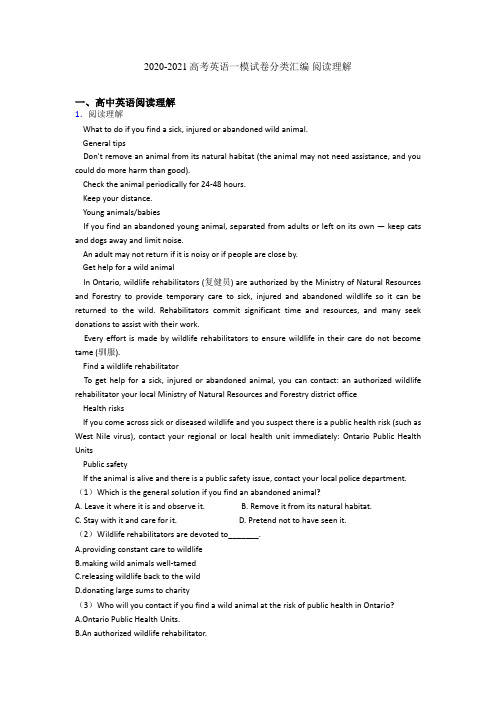
2020-2021高考英语一模试卷分类汇编阅读理解一、高中英语阅读理解1.阅读理解What to do if you find a sick, injured or abandoned wild animal.General tipsDon't remove an animal from its natural habitat (the animal may not need assistance, and you could do more harm than good).Check the animal periodically for 24-48 hours.Keep your distance.Young animals/babiesIf you find an abandoned young animal, separated from adults or left on its own — keep cats and dogs away and limit noise.An adult may not return if it is noisy or if people are close by.Get help for a wild animalIn Ontario, wildlife rehabilitators (复健员) are authorized by the Ministry of Natural Resources and Forestry to provide temporary care to sick, injured and abandoned wildlife so it can be returned to the wild. Rehabilitators commit significant time and resources, and many seek donations to assist with their work.Every effort is made by wildlife rehabilitators to ensure wildlife in their care do not become tame (驯服).Find a wildlife rehabilitatorTo get help for a sick, injured or abandoned animal, you can contact: an authorized wildlife rehabilitator your local Ministry of Natural Resources and Forestry district officeHealth risksIf you come across sick or diseased wildlife and you suspect there is a public health risk (such as West Nile virus), contact your regional or local health unit immediately: Ontario Public Health UnitsPublic safetyIf the animal is alive and there is a public safety issue, contact your local police department.(1)Which is the general solution if you find an abandoned animal?A. Leave it where it is and observe it.B. Remove it from its natural habitat.C. Stay with it and care for it.D. Pretend not to have seen it.(2)Wildlife rehabilitators are devoted to_______.A.providing constant care to wildlifeB.making wild animals well-tamedC.releasing wildlife back to the wildD.donating large sums to charity(3)Who will you contact if you find a wild animal at the risk of public health in Ontario?A.Ontario Public Health Units.B.An authorized wildlife rehabilitator.C.The local police department.D.The Ministry of Natural Resources and Forestry.(4)What's the purpose of the text?A.To teach people how to train animals.B.To give advice on protecting endangered wildlife.C.To call on people to raise pets.D.To introduce the animals in Ontario.【答案】(1)A(2)C(3)A(4)B【解析】【分析】本文是一篇应用文,介绍了对生病、受伤、遗弃的野生动物的救助方法,包括:一般方法、幼崽的救助方法、帮助找到动物康复师、注意公共安全等方式。
2020-2021【英语】英语一模试题分类汇编——阅读理解综合含答案
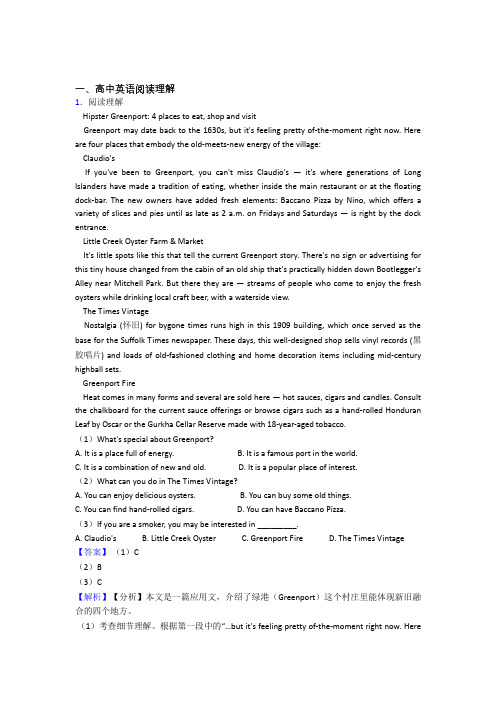
一、高中英语阅读理解1.阅读理解Hipster Greenport: 4 places to eat, shop and visitGreenport may date back to the 1630s, but it's feeling pretty of-the-moment right now. Here are four places that embody the old-meets-new energy of the village:Claudio'sIf you've been to Greenport, you can't miss Claudio's —it's where generations of Long Islanders have made a tradition of eating, whether inside the main restaurant or at the floating dock-bar. The new owners have added fresh elements: Baccano Pizza by Nino, which offers a variety of slices and pies until as late as 2 a.m. on Fridays and Saturdays — is right by the dock entrance.Little Creek Oyster Farm & MarketIt's little spots like this that tell the current Greenport story. There's no sign or advertising for this tiny house changed from the cabin of an old ship that's practically hidden down Bootlegger's Alley near Mitchell Park. But there they are — streams of people who come to enjoy the fresh oysters while drinking local craft beer, with a waterside view.The Times VintageNostalgia (怀旧) for bygone times runs high in this 1909 building, which once served as the base for the Suffolk Times newspaper. These days, this well-designed shop sells vinyl records (黑胶唱片) and loads of old-fashioned clothing and home decoration items including mid-century highball sets.Greenport FireHeat comes in many forms and several are sold here — hot sauces, cigars and candles. Consult the chalkboard for the current sauce offerings or browse cigars such as a hand-rolled Honduran Leaf by Oscar or the Gurkha Cellar Reserve made with 18-year-aged tobacco.(1)What's special about Greenport?A. It is a place full of energy.B. It is a famous port in the world.C. It is a combination of new and old.D. It is a popular place of interest.(2)What can you do in The Times Vintage?A. You can enjoy delicious oysters.B. You can buy some old things.C. You can find hand-rolled cigars.D. You can have Baccano Pizza.(3)If you are a smoker, you may be interested in _________.A. Claudio'sB. Little Creek OysterC. Greenport FireD. The Times Vintage 【答案】(1)C(2)B(3)C【解析】【分析】本文是一篇应用文,介绍了绿港(Greenport)这个村庄里能体现新旧融合的四个地方。
2020-2021【英语】英语一模试题分类汇编——阅读理解综合及答案
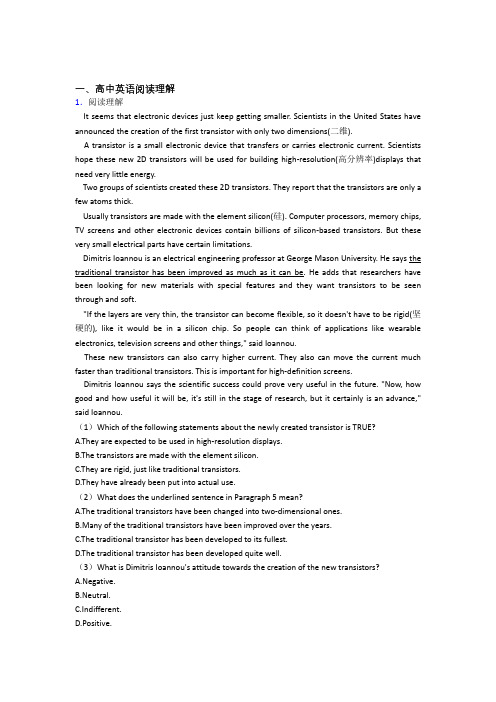
一、高中英语阅读理解1.阅读理解It seems that electronic devices just keep getting smaller. Scientists in the United States have announced the creation of the first transistor with only two dimensions(二维).A transistor is a small electronic device that transfers or carries electronic current. Scientists hope these new 2D transistors will be used for building high-resolution(高分辨率)displays that need very little energy.Two groups of scientists created these 2D transistors. They report that the transistors are only a few atoms thick.Usually transistors are made with the element silicon(硅). Computer processors, memory chips, TV screens and other electronic devices contain billions of silicon-based transistors. But these very small electrical parts have certain limitations.Dimitris Ioannou is an electrical engineering professor at George Mason University. He says the traditional transistor has been improved as much as it can be. He adds that researchers have been looking for new materials with special features and they want transistors to be seen through and soft."If the layers are very thin, the transistor can become flexible, so it doesn't have to be rigid(坚硬的), like it would be in a silicon chip. So people can think of applications like wearable electronics, television screens and other things," said Ioannou.These new transistors can also carry higher current. They also can move the current much faster than traditional transistors. This is important for high-definition screens.Dimitris Ioannou says the scientific success could prove very useful in the future. "Now, how good and how useful it will be, it's still in the stage of research, but it certainly is an advance," said Ioannou.(1)Which of the following statements about the newly created transistor is TRUE?A.They are expected to be used in high-resolution displays.B.The transistors are made with the element silicon.C.They are rigid, just like traditional transistors.D.They have already been put into actual use.(2)What does the underlined sentence in Paragraph 5 mean?A.The traditional transistors have been changed into two-dimensional ones.B.Many of the traditional transistors have been improved over the years.C.The traditional transistor has been developed to its fullest.D.The traditional transistor has been developed quite well.(3)What is Dimitris Ioannou's attitude towards the creation of the new transistors?A.Negative.B.Neutral.C.Indifferent.D.Positive.【答案】(1)A(2)C(3)D【解析】【分析】本文是一篇说明文,美国科学家发明了新的二维晶体管,介绍了新型二维晶体管的相关信息及未来前景。
2020-2021英语一模试题分类汇编——阅读理解综合含答案解析
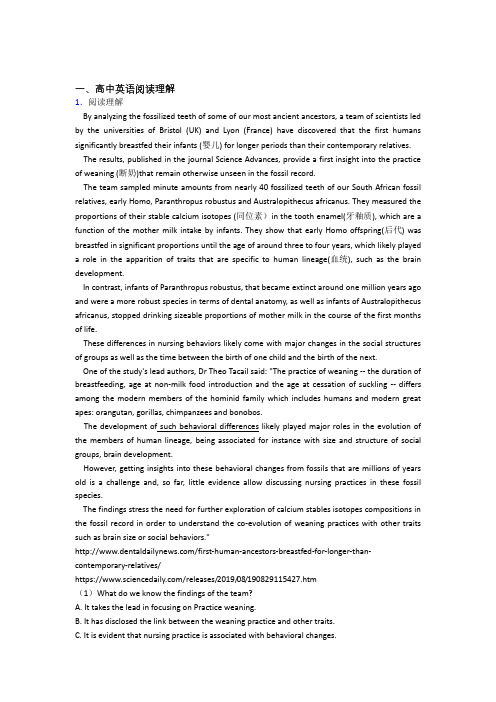
一、高中英语阅读理解1.阅读理解By analyzing the fossilized teeth of some of our most ancient ancestors, a team of scientists led by the universities of Bristol (UK) and Lyon (France) have discovered that the first humans significantly breastfed their infants (婴儿) for longer periods than their contemporary relatives.The results, published in the journal Science Advances, provide a first insight into the practice of weaning (断奶)that remain otherwise unseen in the fossil record.The team sampled minute amounts from nearly 40 fossilized teeth of our South African fossil relatives, early Homo, Paranthropus robustus and Australopithecus africanus. They measured the proportions of their stable calcium isotopes (同位素)in the tooth enamel(牙釉质), which are a function of the mother milk intake by infants. They show that early Homo offspring(后代) was breastfed in significant proportions until the age of around three to four years, which likely played a role in the apparition of traits that are specific to human lineage(血统), such as the brain development.In contrast, infants of Paranthropus robustus, that became extinct around one million years ago and were a more robust species in terms of dental anatomy, as well as infants of Australopithecus africanus, stopped drinking sizeable proportions of mother milk in the course of the first months of life.These differences in nursing behaviors likely come with major changes in the social structures of groups as well as the time between the birth of one child and the birth of the next.One of the study's lead authors, Dr Theo Tacail said: "The practice of weaning -- the duration of breastfeeding, age at non-milk food introduction and the age at cessation of suckling -- differs among the modern members of the hominid family which includes humans and modern great apes: orangutan, gorillas, chimpanzees and bonobos.The development of such behavioral differences likely played major roles in the evolution of the members of human lineage, being associated for instance with size and structure of social groups, brain development.However, getting insights into these behavioral changes from fossils that are millions of years old is a challenge and, so far, little evidence allow discussing nursing practices in these fossil species.The findings stress the need for further exploration of calcium stables isotopes compositions in the fossil record in order to understand the co-evolution of weaning practices with other traits such as brain size or social behaviors."/first-human-ancestors-breastfed-for-longer-than-contemporary-relatives/https:///releases/2019/08/190829115427.htm(1)What do we know the findings of the team?A. It takes the lead in focusing on Practice weaning.B. It has disclosed the link between the weaning practice and other traits.C. It is evident that nursing practice is associated with behavioral changes.D. It's contemporary humans that spend more time breastfeeding their infants.(2)What does the underlined phrase "such behavioral differences" in Paragraph 7 most probably refer to?A. Differences in the calcium isotope in the teeth.B. Differences in the social structure of groups.C. Differences in the practice of weaning.D. Differences in the change of behaviors.(3)What does the passage mainly talk about?A. The evolution of human lineage.B. The possible influence of nursing behaviors.C. The exploration of compositions in the fossil.D. The function of mother milk at the age of infants.【答案】(1)A(2)C(3)B【解析】【分析】本文是一篇说明文,通过对祖先牙齿化石的研究,科学家们发现第一批用母乳喂养婴儿的人类比同时代的其他的近亲在时间上要长很多,而这种育幼差异可能在人类进化中扮演了重要角色,比如大脑发育和社会群体方面。
2020-2021英语一模试题分类汇编——阅读理解综合及答案解析
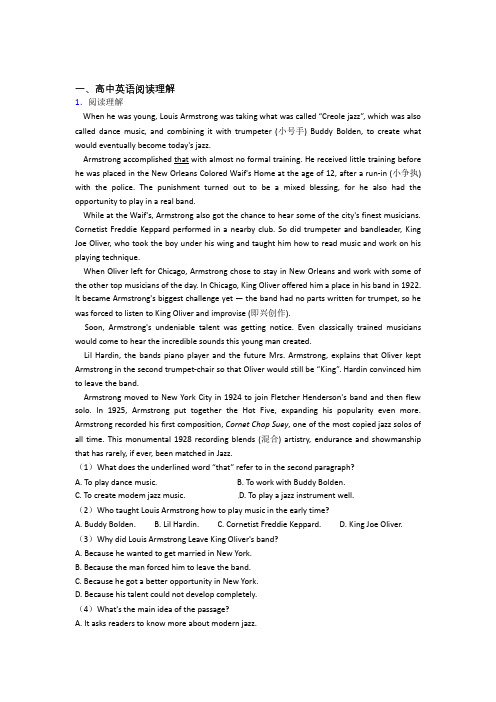
一、高中英语阅读理解1.阅读理解When he was young, Louis Armstrong was taking what was called “Creole jazz”, which was also called dance music, and combining it with trumpeter (小号手) Buddy Bolden, to create what would eventually become today's jazz.Armstrong accomplished that with almost no formal training. He received little training before he was placed in the New Orleans Colored Waif's Home at the age of 12, after a run-in (小争执) with the police. The punishment turned out to be a mixed blessing, for he also had the opportunity to play in a real band.While at the Waif's, Armstrong also got the chance to hear some of the city's finest musicians. Cornetist Freddie Keppard performed in a nearby club. So did trumpeter and bandleader, King Joe Oliver, who took the boy under his wing and taught him how to read music and work on his playing technique.When Oliver left for Chicago, Armstrong chose to stay in New Orleans and work with some of the other top musicians of the day. In Chicago, King Oliver offered him a place in his band in 1922. It became Armstrong's biggest challenge yet — the band had no parts written for trumpet, so he was forced to listen to King Oliver and improvise (即兴创作).Soon, Armstrong's undeniable talent was getting notice. Even classically trained musicians would come to hear the incredible sounds this young man created.Lil Hardin, the bands piano player and the future Mrs. Armstrong, explains that Oliver kept Armstrong in the second trumpet-chair so that Oliver would still be “King”. Hardin convinced him to leave the band.Armstrong moved to New York City in 1924 to join Fletcher Henderson's band and then flew solo. In 1925, Armstrong put together the Hot Five, expanding his popularity even more. Armstrong recorded his first composition, Cornet Chop Suey, one of the most copied jazz solos of all time. This monumental 1928 recording blends (混合) artistry, endurance and showmanship that has rarely, if ever, been matched in Jazz.(1)What does the underlined word “that” refer to in the second paragraph?A. To play dance music.B. To work with Buddy Bolden.C. To create modem jazz music.D. To play a jazz instrument well.(2)Who taught Louis Armstrong how to play music in the early time?A. Buddy Bolden.B. Lil Hardin.C. Cornetist Freddie Keppard.D. King Joe Oliver.(3)Why did Louis Armstrong Leave King Oliver's band?A. Because he wanted to get married in New York.B. Because the man forced him to leave the band.C. Because he got a better opportunity in New York.D. Because his talent could not develop completely.(4)What's the main idea of the passage?A. It asks readers to know more about modern jazz.B. It introduces one of the greatest jazz musicians.C. It introduces the development of jazz.D. It describes the importance of talent in playing jazz.【答案】(1)C(2)D(3)D(4)B【解析】【分析】本文是一篇记叙文,介绍了音乐人Louis Armstrong学习音乐的过程。
2020-2021【英语】英语一模试题分类汇编——阅读理解综合及详细答案
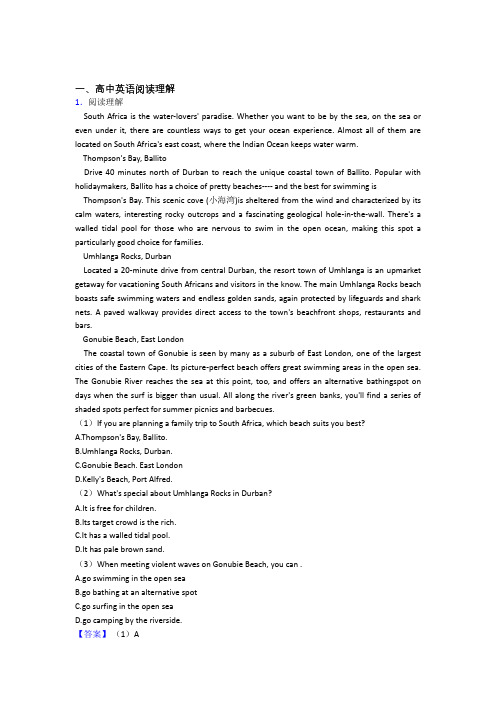
一、高中英语阅读理解1.阅读理解South Africa is the water-lovers' paradise. Whether you want to be by the sea, on the sea or even under it, there are countless ways to get your ocean experience. Almost all of them are located on South Africa's east coast, where the Indian Ocean keeps water warm.Thompson's Bay, BallitoDrive 40 minutes north of Durban to reach the unique coastal town of Ballito. Popular with holidaymakers, Ballito has a choice of pretty beaches---- and the best for swimming isThompson's Bay. This scenic cove (小海湾)is sheltered from the wind and characterized by its calm waters, interesting rocky outcrops and a fascinating geological hole-in-the-wall. There's a walled tidal pool for those who are nervous to swim in the open ocean, making this spot a particularly good choice for families.Umhlanga Rocks, DurbanLocated a 20-minute drive from central Durban, the resort town of Umhlanga is an upmarket getaway for vacationing South Africans and visitors in the know. The main Umhlanga Rocks beach boasts safe swimming waters and endless golden sands, again protected by lifeguards and shark nets. A paved walkway provides direct access to the town's beachfront shops, restaurants and bars.Gonubie Beach, East LondonThe coastal town of Gonubie is seen by many as a suburb of East London, one of the largest cities of the Eastern Cape. Its picture-perfect beach offers great swimming areas in the open sea. The Gonubie River reaches the sea at this point, too, and offers an alternative bathingspot on days when the surf is bigger than usual. All along the river's green banks, you'll find a series of shaded spots perfect for summer picnics and barbecues.(1)If you are planning a family trip to South Africa, which beach suits you best?A.Thompson's Bay, Ballito.B.Umhlanga Rocks, Durban.C.Gonubie Beach. East LondonD.Kelly's Beach, Port Alfred.(2)What's special about Umhlanga Rocks in Durban?A.It is free for children.B.Its target crowd is the rich.C.It has a walled tidal pool.D.It has pale brown sand.(3)When meeting violent waves on Gonubie Beach, you can .A.go swimming in the open seaB.go bathing at an alternative spotC.go surfing in the open seaD.go camping by the riverside.【答案】(1)A(3)B【解析】【分析】本文是一篇应用文,介绍了南非三个著名的海滨旅游景点的信息。
2020-2021英语一模试题分类汇编——阅读理解综合及详细答案

一、高中英语阅读理解1.阅读理解When he was young, Louis Armstrong was taking what was called “Creole jazz”, which was also called dance music, and combining it with trumpeter (小号手) Buddy Bolden, to create what would eventually become today's jazz.Armstrong accomplished that with almost no formal training. He received little training before he was placed in the New Orleans Colored Waif's Home at the age of 12, after a run-in (小争执) with the police. The punishment turned out to be a mixed blessing, for he also had the opportunity to play in a real band.While at the Waif's, Armstrong also got the chance to hear some of the city's finest musicians. Cornetist Freddie Keppard performed in a nearby club. So did trumpeter and bandleader, King Joe Oliver, who took the boy under his wing and taught him how to read music and work on his playing technique.When Oliver left for Chicago, Armstrong chose to stay in New Orleans and work with some of the other top musicians of the day. In Chicago, King Oliver offered him a place in his band in 1922. It became Armstrong's biggest challenge yet — the band had no parts written for trumpet, so he was forced to listen to King Oliver and improvise (即兴创作).Soon, Armstrong's undeniable talent was getting notice. Even classically trained musicians would come to hear the incredible sounds this young man created.Lil Hardin, the bands piano player and the future Mrs. Armstrong, explains that Oliver kept Armstrong in the second trumpet-chair so that Oliver would still be “King”. Hardin convinced him to leave the band.Armstrong moved to New York City in 1924 to join Fletcher Henderson's band and then flew solo. In 1925, Armstrong put together the Hot Five, expanding his popularity even more. Armstrong recorded his first composition, Cornet Chop Suey, one of the most copied jazz solos of all time. This monumental 1928 recording blends (混合) artistry, endurance and showmanship that has rarely, if ever, been matched in Jazz.(1)What does the underlined word “that” refer to in the second paragraph?A. To play dance music.B. To work with Buddy Bolden.C. To create modem jazz music.D. To play a jazz instrument well.(2)Who taught Louis Armstrong how to play music in the early time?A. Buddy Bolden.B. Lil Hardin.C. Cornetist Freddie Keppard.D. King Joe Oliver.(3)Why did Louis Armstrong Leave King Oliver's band?A. Because he wanted to get married in New York.B. Because the man forced him to leave the band.C. Because he got a better opportunity in New York.D. Because his talent could not develop completely.(4)What's the main idea of the passage?A. It asks readers to know more about modern jazz.B. It introduces one of the greatest jazz musicians.C. It introduces the development of jazz.D. It describes the importance of talent in playing jazz.【答案】(1)C(2)D(3)D(4)B【解析】【分析】本文是一篇记叙文,介绍了音乐人Louis Armstrong学习音乐的过程。
2020-2021高考英语一模试卷分类汇编 阅读理解(附答案)

2020-2021高考英语一模试卷分类汇编阅读理解(附答案)一、高中英语阅读理解1.阅读理解At first, Michael Surrell didn't see the black smoke or flames shooting from the windows of his neighbors' home. He and his wife had just parked around the corner from their own house in Allentown, Pennsylvania, when they got a call from one of his daughters, "The house next door is on fire!" He went to investigate. That's when he saw two women and a girl hysterical (歇斯底里的)on their porch."The baby's in there!" one of the women cried. Though the fire department had been called, Surrell, then 64, instinctively ran inside. "The baby" was 8-year-old Tiara Roberts, the woman's granddaughter and a playmate of Surrell's three youngest kids, then 8, 10, and 12. The other two on the porch were Tiara's aunt and cousin.Entering the burning house was like "running into a bucket of black paint," Surrell says. The thick smoke caused him to stumble blindly around, burned his eyes, and made it impossible to breathe. The conditions would have been hazardous for anyone, but for Surrell, who has chronic obstructive pulmonary disease (慢性阻塞性肺疾病), they were life-threatening. He was the last person who should have run into a burning building--- he has lung disease. But that didn't stop him.After a few minutes in the smoke filled house, he retreated outside to catch his breath. "Where is Tiara?" he asked desperately." The second floor." her aunt shouted back.Surrell knew he couldn't hold his breath for long. So he uttered a little prayer, "Well, Lord, this is it. You gotta help me, because I'm not coming out without that little girl." Taking a deep breath, he went in a second time.The darkness was overwhelming. Yet because the house had a similar layout to his, he found the stairs and made it to the second floor. He turned to the right and was met by intense heat. He was already out of breath."Baby girl, where are you?" His throat and lungs burned as if he'd inhaled fire instead of the smoke and soot in the air. Every blink stung his eyes. All he could hear was the crackling and popping of burning wood. ①.Still unable to see, Surrell fell to his knees on the hot wood floor. He crawled toward the sound, feeling around for any sign of the girl. An ominous thought crossed his mind: I'm probably gonna die up here.Finally he touched something. A shoe, then an ankle. He pulled Tiara toward him. ②Her body was limp and she wasn't breathing. He scooped her into his arms and stood. He felt the heat of the flames on his cheeks. Turning, he fought through the smoke and ran blindly into the blackness. The next thing he knew, he was at the front door, then outside. Surrell put Tiara down on the porch.③. A voice told him, "You have to breathe for her." He started CPR -the first time he'd ever done so. The women stood behind him, praying silently. Soon a soot-filled cough came from Tiara's throat. Surrell gave five more breaths. She coughed again. Her eyes flickered. He gave one final breath. She opened her eyes and took a breath on her own.④.Their eyes met. Surrell hugged her tight and said, "Uncle's got you." Soon after, his throat closed off.Surrell woke up in the hospital a couple of days later, having suffered severe burns to his windpipe and the upper portion of his lungs. He spent over a week in the hospital. Tiara was released from the hospital after a few days. The fire exacerbated Surrell's pulmonary condition, and he feels the effects even two years later. As a result, he takes extra medication that helps open his airways. "It's a small price to pay," he says. "I'd do it again in a heartbeat. Wouldn't giveit a second thought."(1)Michael Surrell ran to save "the baby" mainly because______.A.he was on the scene casuallyB.he was driven by instinctC.his daughter was in dangerD.his own house was at risk(2)Why should Surrell be the last person to run into a burning building?A.The fire department had been called.B.He was 64 years old at that time.C.The condition was life-threatening.D.He had chronic pulmonary disease.(3)In the course of rescue, Surrell______.A.had to move out for breath because of smokeB.was prevented by the overwhelming smokeC.made it to the second floor without any troubleD.could clearly hear the sound made by the baby(4)Which blank could the sentence "Then a weak but distinct voice emerged" be best put in?A.①B.②C.③D.④(5)From the last paragraph, we can learn that______. .A.Surrell came back to life a week laterB.Tiara had to stay in hospital for weeksC.Surrell's disease became more seriousD.Tiara needed further extra medication(6)What can be a suitable title for the passage?A.Breathe for HerB.Struggle to surviveC.A small price to payD.A man with lung disease【答案】(1)B(2)D(3)A(4)A(5)C(6)A【解析】【分析】本文是一篇记叙文,一个患有慢性阻塞性肺疾病的人不顾个人安危去邻居家着火的房子里成功救出小女孩,因此造成他肺部疾病加重,但是他对自己所做的从不后悔。
- 1、下载文档前请自行甄别文档内容的完整性,平台不提供额外的编辑、内容补充、找答案等附加服务。
- 2、"仅部分预览"的文档,不可在线预览部分如存在完整性等问题,可反馈申请退款(可完整预览的文档不适用该条件!)。
- 3、如文档侵犯您的权益,请联系客服反馈,我们会尽快为您处理(人工客服工作时间:9:00-18:30)。
一、高中英语阅读理解1.阅读理解One of my favorite hobbies is exchanging old-fashioned, paper-with-a-stamp-on-it postcards with random strangers around the world.The Postcrossing Project was created by Paulo Magalhaes in 2005. He liked getting mails—especially postcards. He thought others did, too—but how could he connect with them? That's when he came up with the idea of an online platform (): There, postcard lovers like me can sign up to send a postcard to someone who has registered online, and receive a postcard in return.Along with a randomly selected address, participants get a unique code to put on the postcard. When the postcard arrives, the recipient registers that code with the site, which then causes the sender's address to be given to another postcrosser in turn. In practice, this means that for nearly every postcard I send (a few get lost in the mail) I get one back. And since I never know who will send me a card or where in the world they live, every trip to the mailbox holds the potential for a wonderful surprise.Privacy-conscious Americans might worry about sharing their address with strangers overseas. But postcrossers are friendly, polite, respectful folks—in more than 450 cards exchanged, I've yet to have a bad experience.On days when the international news is depressing, postcrossing is my comfort. There's nothing like getting a card from a child in China just learning to write in English, or a grandmother in Belarus describing her most recent gardening success to remind me that we truly are members of one global family, far more similar than we are different.It seems like such a small thing to send out a postcard. But as travel and communication technology continue to shrink the world, it's important to remember that it isn't just for diplomats and politicians to represent our country anymore. All of us have the power—and perhaps the responsibility—to be ambassadors, to show the best of your country to the world.And it's good to know that what you need to accomplish this is not necessarily complicated or expensive. It can be as simple as a postcard.(1)Why did Paulo set up ?A. To discuss personal hobbies with strangers.B. To exchange postcards with others in the worldC. To collect different postcards from other countries.D. To provide a platform for communication online.(2)According to the passage, postcrossers __________.A. don't know who will send them postcardsB. are sure to get a postcard back immediatelyC. often choose a receiver's address carefullyD. register every postcard they receive online (3)What did the writer learn from postcrossing?A. The international news is usually depressing.B. Americans are more conscious about privacy.C. Postcrossers sometimes describe their bad experience.D. The whole world is actually a big family.(4)What does the underlined word "this" refer to?A. Choosing a diplomat to represent a country.B. Having the responsibility to be an ambassador.C. Showing the best of your country.D. Shrinking the world with communication technology.【答案】(1)B(2)A(3)D(4)C【解析】【分析】本文是一篇应用文,介绍了网站,一个可以让世界各地的陌生人交换老式的、带有邮票的明信片的网站,由Paulo Magalhaes 在2005年创立。
文章说明了在这个网站和他人交换明信片的方式,以及作者认为这是一种能够向世界展示自己国家最好的一面的方式,而且它并不复杂也不昂贵。
(1)考查细节理解。
根据第二段中的“That's when he came up with the idea of an online platform (): There, postcard lovers like me can sign up to send a postcard to someone who has registered online, and receive a postcard in re turn.”就在那时,他想到了一个在线平台():在那里,像我这样的明信片爱好者可以注册,向网上注册的用户发送明信片,并收到明信片作为回报。
可知保罗建立了是为了和世界上的其他人交换明信片。
故选B。
(2)考查细节理解。
根据第三段中的“And since I never know who will send me a card or where in the world they live, every trip to the mailbox holds the potential for a wonderful surprise.”因为我不知道谁会给我寄贺卡,也不知道他们住在世界的什么地方,所以每次去邮箱都有可能带来惊喜。
可知postcrosser并不知道谁会给他们寄明信片。
故选A。
(3)考查细节理解。
根据倒数第三段中的“There's nothing like getting a card from a child in China just learning to write in English, or a grandmother in Belarus describing her most recent gardening success to remind me that we truly are members of one global family, far more similar than we are different.”在中国,没有什么比收到孩子们寄来的贺卡更能提醒我,我们是同一个全球大家庭的一员,相似之处远远多于不同之处。
)可知作者从postcrossing中认识整个世界实际上是一个大家庭。
故选D。
(4)考查代词指代。
根据倒数第二段中的“All of us have the power—and perhaps the responsibility—to be ambassadors, to show the best of your country to the world.”我们所有人都有能力——或许也有责任——成为大使,向世界展示你们国家最好的一面。
可知要向世界展示自己国家最好的一面,你需要做的并不复杂也不昂贵。
故this指代“展示你国家最好的一面。
